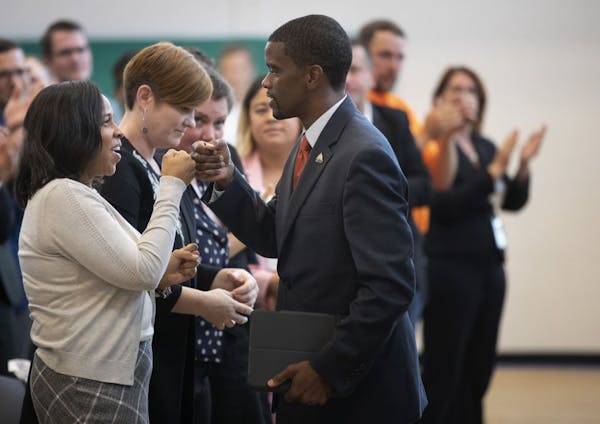Mexican bakeries, hair salons and electronics stores, with signs written in Spanish and walls adorned with colorful murals, enliven E. Lake Street in Minneapolis. To the north, Cedar-Riverside's restaurants and markets serve the city's biggest East African hub.
Yet city leaders think they need to do something to elevate these city neighborhoods and others heavily populated by immigrants, blacks and American Indians. Mayor Jacob Frey and some council members are calling for an infusion of city spending to clean up litter, improve lighting and spruce up building facades.
In his 2020 budget presented Thursday, Frey wants to establish six "cultural districts" identified by the mayor, several council members and community groups: W. Broadway Avenue in north Minneapolis, Central Avenue in Northeast, Cedar-Riverside, Franklin Avenue, E. Lake Street and 38th Street.
In Frey's proposed budget, the districts would receive $550,000 for improving lighting, street sweeps and trash pickup and $200,000 for facade upgrades. Another $200,000 would go toward creating large art projects, murals and arts events. Meet Minneapolis, the city's tourism nonprofit, would receive $350,000 to market and promote the districts.
The districts would receive additional funding focused on business growth and ownership. This includes part of a new, $2.5 million fund that would provide no-interest loans for business owners in "racially segregated areas with concentrated poverty" to buy their properties, according to budget documents.
"If we're able to set the foundation, if we're able to ensure that the streets are clean, and are properly lit and are well-invested in, it gives a sense of both pride and real practical ownership in these districts by the communities that have made them wonderful to begin with," Frey said. "That is a bigger driver for safety than anything else."
Frey made cultural districts one of the main points in his address Thursday, when he announced his $1.6 billion budget, and part of a theme of economic inclusion and boosting the city's minority-owned businesses.
Council Member Alondra Cano said the cultural district designation will help E. Lake Street, where "the very communities who made this corridor thrive are being pushed out through rising rents, more costly commercial space, and the threat of raids and deportations."
Council Member Abdi Warsame, who represents Cedar-Riverside and participated in the selection of the districts, said highlighting these areas will "celebrate the variety of cultures we have in our city."
"Having this cultural designation, and all the support that comes with it, helps us develop, or rebrand, the neighborhood," Warsame said Friday.
Ultimately, Warsame said his main goal with cultural districts is to decrease the inequality gap and create opportunities for immigrants and people of color.
"The cultural district should not be something in name only," he said. "We want to make sure this cultural district idea helps our small businesses, beautifies our neighborhoods and makes our lives better."
Aside from its designation as a cultural district, Cedar-Riverside is also the proposed site for Africa Village, a public market spearheaded by Warsame and Frey. During his budget address Thursday, Frey compared the upcoming market to other renowned immigrant neighborhoods, including Chinatown in New York City and Little Haiti in Miami.
Frey said he hoped that years from now, businesses succeed in owning their own properties.
"I want to see the doors on East Lake Street and West Broadway flung open in a way that invites commerce and economic inclusion and excitement," he said.
Miguel Otárola • 612-673-4753

Trail section at one of Minnesota's most iconic spots closing for rehab

Will 'shotgun only' zone for deer in southern Minnesota be abolished?

Four Minnesotans catch salmonella in outbreak linked to basil sold at Trader Joe's

